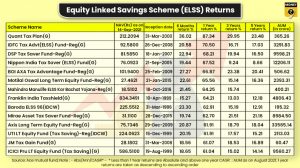ELSS funds: Factors you should consider before investing
ELSS returns are market-linked and are directly related to the performance of the equity markets.
- Himali Patel
- Last Updated : September 15, 2021, 17:46 IST

With the market hitting new highs daily, investors appear to have begun booking profits, resulting in reduced equity inflows in August 2021 than July 2021. Investors seem to remain bullish on markets, as the category has seen consistent and positive inflows since March 2021. The data by the Association of Mutual Funds in India (AMFI) shows that the equity mutual funds saw an inflow of Rs 8,666.68 crore in August as compared to Rs 22,583.52 in July.
Further, the recent report by Motilal Oswal Financial Services on Fund folio noted that the total equity value for top 20 AMCs increased by 6.3% month-on-month in August 2021. Among the top ten funds, the highest MoM was witnessed in Axis Mutual Fund (11%), SBI Mutual Fund (10.1%), UTI Mutual Fund (8.7%), Mirae Asset Mutual Fund (6.7%), and ICICI Prudential Mutual Fund (6.4%).
When it comes to the ELSS fund as per the value research data, the fund has given a return of 56.64%, 15.64%, and 14.74% over one, three, and five years as of 14 September 2021. “On an average, these funds gave a return of 11.3% over the last 10 years. These are inflation-beating returns that beat all other tax-saving options in the market,” said Prateek Mehta, Co-Founder, and Chief Business Officer, Scripbox. (See the table of ELSS Returns)

Things to consider before investing in ELSS
ELSS returns are market-linked and are directly related to the performance of the equity markets. Markets fluctuate in the short run, and these swings are expected while investing in equity markets.
“Investing decisions shouldn’t be based on market timing, and ELSS investing should not be looked at from a short-term perspective. Even though ELSS investments generally have a minimum lock-in of three years, it is still beneficial to link these investments to your longer-term goals. Keep your investment horizons longer and be patient to get favorable outcomes,” said Mehta.
That said, it is critical to distribute your investments equally throughout the year via SIPs rather than making them all at once to avoid the impact of short-term market swings. This also helps distribute risk based on market ups and downs, even when markets are at all-time highs, as these highs simply reflect future expectations.
“If you are investing a lump sum amount at one go, you will get your investment + gains after three years, but if you are investing in the SIP format, you must remember that each of your monthly SIP instalment gets locked-in for three years individually,” said Manish P Hingar, Founder of Fintoo.
As the markets are at an all-time high, the market’s future direction cannot be forecast. Therefore, rather than attempting to time the market, financial experts advise you to invest now and spend the rest of your time aiding your assets to grow.
“As they say, ‘when it’s about investing, the right time is now. Waiting for the right opportunity to invest based on highs and lows in the market will make it extremely difficult for you to identify the best time to start investing and will unnecessarily delay your investments,” explained Hingar.
Today, the pandemic has made investors know the value of several fundamental investment principles, such as not attempting to time the market and keeping an appropriate asset allocation. It has also re-emphasized the importance of investors removing emotions from investment decisions and making them based on strong fundamentals and their risk profile.
Further equity investments should be made with a minimum three-year horizon in mind to allow investors to take advantage of tax savings. Additionally, it is a product for which Sebi has not imposed any allocation limits based on market capitalisation (as has been done for multi-cap funds), which allows the fund management to invest in stocks with a range of market capitalisations.
Download Money9 App for the latest updates on Personal Finance.
Related
- पहली छमाही में रियल एस्टेट में संस्थागत निवेश 37% घटकर तीन अरब डॉलर रहने का अनुमान
- Budget’24: New LTCG rule to hit long-term property owners hard
- Looking to buy gold? Buy now before it’s too late!
- Budget 2024: What is NPS ‘Vatsalya’ scheme? How to apply & other benefits?
- Budget’ 24: Startup ecosystem all smiles with scrapping of angel tax
- Budget’24: New NPS scheme for minors launched, here’s how you can benefit

